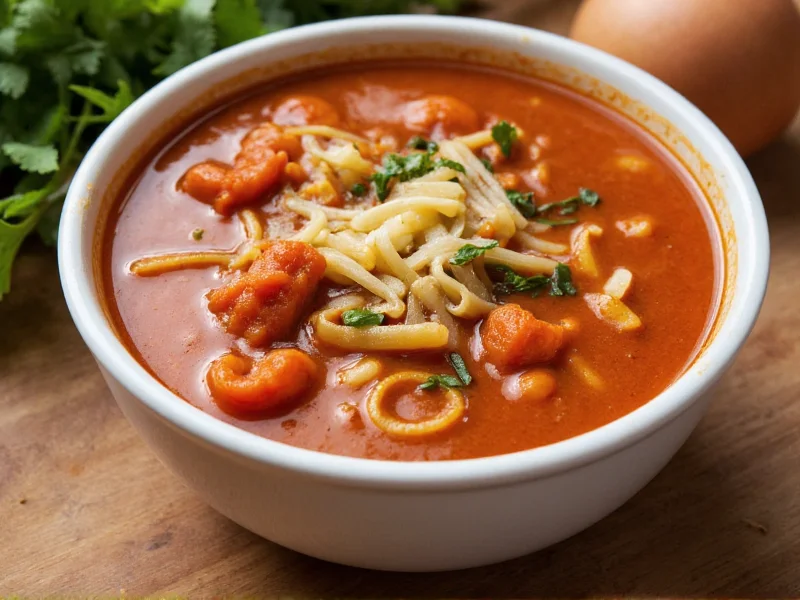When evaluating canned soup quality, understanding what makes certain options stand out from the crowded grocery aisle is essential. With over 1,200 soup varieties available in most supermarkets, selecting genuinely good canned soup requires examining several key factors that impact both nutrition and taste.
What Defines Quality in Canned Soup
Quality canned soup maintains nutritional integrity while delivering satisfying flavor. Unlike lower-quality options that rely on artificial enhancers, premium canned soups use cooking techniques that preserve ingredient quality during the canning process. The best options undergo minimal processing while ensuring food safety through proper thermal treatment.
Key Factors for Evaluating Good Canned Soup Options
Ingredient Quality and Transparency
Examine the ingredient list for recognizable components. The best canned soups list specific vegetables like "diced tomatoes" rather than vague terms like "natural flavors." High-quality options typically contain 5-8 core ingredients without unnecessary additives. Brands that disclose sourcing information often demonstrate greater commitment to quality.
Nutritional Profile Considerations
While convenience drives canned soup purchases, nutritional value separates good options from exceptional ones. Look for soups providing at least 2 grams of fiber and 5 grams of protein per serving while keeping sodium below 480mg. The healthiest canned soup varieties maintain vegetable integrity without excessive starches or thickeners.
| Quality Indicator | Good Canned Soup Standard | Lower Quality Warning Signs |
|---|---|---|
| Sodium Content | Under 480mg per serving | Over 700mg per serving |
| Protein Level | At least 5g per serving | Less than 3g per serving |
| Fiber Content | 3g+ per serving | Less than 1g per serving |
| Ingredient List | 8 or fewer recognizable ingredients | Long list with chemical-sounding components |
Processing Methods Matter
The canning process itself affects quality. Superior canned soups use steam injection or rotary cooking methods that preserve nutrients better than traditional static retort systems. These advanced techniques maintain vegetable texture and color while ensuring thorough heating for safety. The best canned soup manufacturers also implement strict quality control during filling to prevent oxidation that degrades flavor over time.
Top Canned Soup Categories Worth Considering
Cream-Based Soups Done Right
High-quality cream-based soups avoid artificial thickeners by using pureed vegetables for texture. The best low sodium cream of mushroom soup options incorporate actual mushrooms rather than flavorings, with visible pieces maintaining structure after canning. Look for varieties using olive oil instead of butter for dairy-free options that still deliver rich mouthfeel.
Broth and Stock Foundations
Exceptional canned broth options undergo slow reduction before canning, concentrating flavors naturally without requiring excessive sodium. The most nutritious chicken broth canned soup varieties contain visible gelatin from proper bone simmering, indicating collagen preservation. Vegetable broth options with roasted ingredients provide deeper flavor profiles without artificial enhancers.
Specialty Dietary Options
For specific dietary needs, certain canned soups excel. Organic canned tomato soup with added lentils offers complete protein while maintaining low sodium levels. Vegan options using coconut milk instead of dairy provide creamy texture without compromising clean ingredient standards. Gluten-free certified soups avoid hidden wheat derivatives common in lower-quality products.
Practical Tips for Selecting the Best Canned Soup
Reading Labels Effectively
When comparing canned soup nutrition facts, focus on the sodium-to-serving-size ratio rather than absolute numbers. A soup with 400mg sodium in a 1.5 cup serving actually contains less sodium per ounce than one with 350mg in a 1 cup serving. Check for "no salt added" designations which allow you to control seasoning personally.
Seasonal Availability Patterns
Many quality canned soup producers align with agricultural seasons. Tomato-based varieties typically peak in quality from August through October when tomatoes are freshly harvested. Root vegetable soups show best quality from November through February. Understanding these patterns helps identify when specific canned soup types reach optimal quality.
Storage and Shelf Life Knowledge
Proper storage significantly impacts canned soup quality. Store cans in cool, dry places below 75°F (24°C) to maintain flavor integrity. Most quality canned soups remain at peak quality for 18-24 months, though low-acid varieties like cream soups should be consumed within 12 months for best results. Avoid cans with dents along seams or bulging ends, which indicate potential spoilage.
Enhancing Canned Soup Quality at Home
Even good canned soup can be elevated with simple techniques. For cream-based varieties, stirring in a tablespoon of nutritional yeast adds umami depth without sodium. Adding fresh herbs during reheating transforms basic canned tomato soup into restaurant-quality fare. For broth-based options, a splash of acid like lemon juice or vinegar brightens flavors that may have mellowed during storage.
Common Misconceptions About Canned Soup
Many believe canned soup must be high in sodium, but numerous quality options exist below 300mg per serving. Others assume canned vegetables lose all nutritional value, yet studies show canned tomatoes actually have higher lycopene bioavailability than fresh. The notion that "all canned soup contains MSG" is inaccurate—many premium brands explicitly avoid it while maintaining flavor complexity.
Making Informed Canned Soup Choices
Selecting genuinely good canned soup requires balancing convenience with quality considerations. The most nutritious canned soup options deliver recognizable ingredients, appropriate sodium levels, and visible vegetable pieces that maintain texture. By understanding labeling practices and seasonal production cycles, consumers can consistently choose high-quality canned soup that provides both convenience and nutritional value without compromising on taste or ingredient integrity.











 浙公网安备
33010002000092号
浙公网安备
33010002000092号 浙B2-20120091-4
浙B2-20120091-4